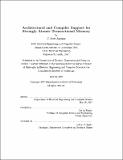Architectural and compiler support for strongly atomic transactional memory
Author(s)
Ananian, C. Scott (Clifford Scott), 1976-
DownloadFull printable version (1.166Mb)
Other Contributors
Massachusetts Institute of Technology. Dept. of Electrical Engineering and Computer Science.
Advisor
Martin Rinard.
Terms of use
Metadata
Show full item recordAbstract
Transactions are gaining ground as a programmer-friendly means of expressing concurrency, as microarchitecture trends make it clear that parallel systems are in our future. This thesis presents the design and implementation of four efficient and powerful transaction systems: ApeX, an object oriented software-only system; UTM and LTM, two scalable systems using custom processor extensions; and HyApeX, a hybrid of the software and hardware systems, obtaining the benefits of both. The software transaction system implements strong atomicity, which ensures that transactions are protected from the influence of nontransactional code. Previous software systems use weaker atomicity guarantees because strong atomicity is presumed to be too expensive. In this thesis strong atomicity is obtained with minimal slowdown for nontransactional code. Compiler analyses can further improve the eciency of the mechanism, which has been formally veried with the Spin model-checker. The low overhead of ApeX allows it to be protably combined with a hardware transaction system to provide fast execution of short and small transactions, while allowing fallback to software for large or complicated transactions. I present UTM, a hardware transactional memory system allowing unbounded virtualizable transactions, and show how a hybrid system can be obtained.
Description
Thesis (Ph. D.)--Massachusetts Institute of Technology, Dept. of Electrical Engineering and Computer Science, 2007. This electronic version was submitted by the student author. The certified thesis is available in the Institute Archives and Special Collections. Includes bibliographical references (p. 199-212).
Date issued
2007Department
Massachusetts Institute of Technology. Department of Electrical Engineering and Computer SciencePublisher
Massachusetts Institute of Technology
Keywords
Electrical Engineering and Computer Science.